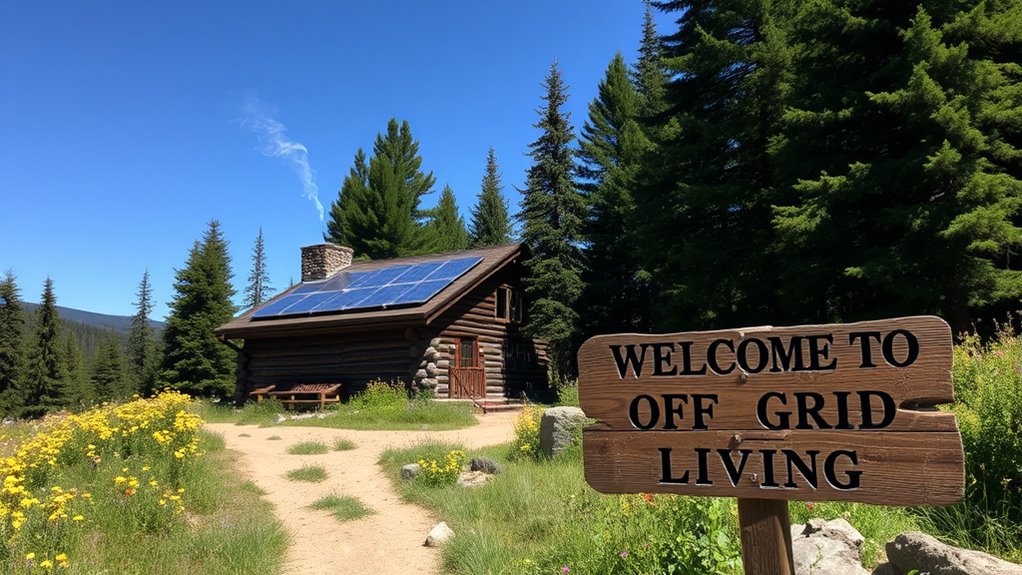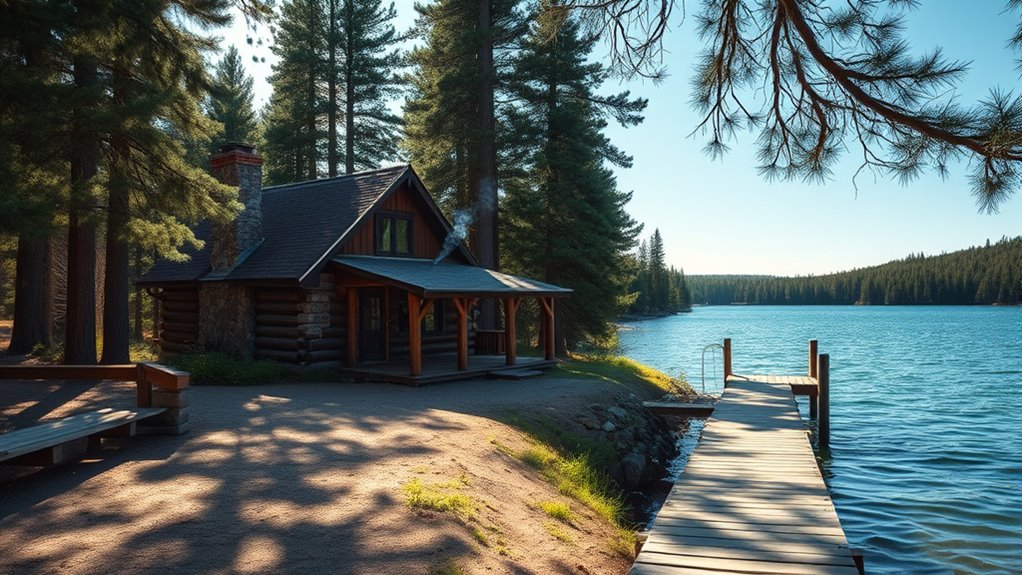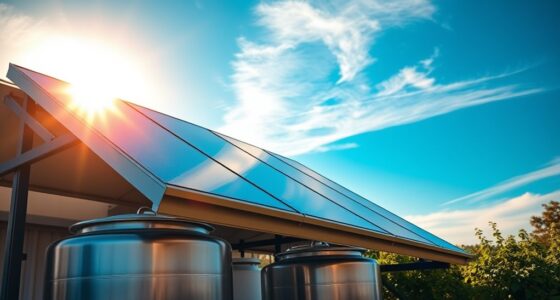Before going off-grid, it’s essential to understand how to set up renewable energy systems like solar or wind power and manage water with rain harvesting and filtration. Check local laws and permits to avoid legal issues, and plan for waste disposal methods such as composting. Costs, maintenance, and your lifestyle choices also matter. To create a sustainable, self-sufficient lifestyle that connects you with nature, there’s more to explore beyond these basics.
Key Takeaways
- Research local laws, zoning, and permits to ensure legal compliance for off-grid systems and construction.
- Choose reliable renewable energy sources like solar, wind, or hydro based on your location and needs.
- Plan for water independence through rainwater harvesting, wells, or natural sources with proper filtration.
- Budget for upfront costs and ongoing maintenance of energy, water, and waste management systems.
- Consider lifestyle changes, including reduced utility reliance, increased self-sufficiency, and environmental impact.

Ever wondered what it’s like to live independently from public utilities? Off-grid living offers a lifestyle where you disconnect from traditional sources of electricity, water, and waste management, choosing instead to rely on self-sufficient systems. You might install solar panels, harness wind or hydro power, or set up rainwater collection systems to meet your energy and water needs. This approach reduces your dependence on public infrastructure, giving you greater control over your resources and lifestyle.
Energy sources are a core part of off-grid living. Solar power is the most common, as it’s relatively easy to install and maintain. Wind turbines and small-scale hydroelectric systems are also options, especially if you live near a steady wind or water source. You’ll want to evaluate your location’s climate and natural resources to determine the best fit. For water, many off-grid homes rely on wells, natural springs, or rainwater harvesting. Installing a reliable collection system and filtration ensures you have clean water for daily use. Proper waste management becomes vital, so composting toilets and recycling practices are often part of the setup. These systems help minimize waste and preserve the environment.
Living off-grid also means charting legal considerations. Regulations and building codes vary by area, especially in remote locations. While you might enjoy more freedom in rural zones, it’s important to research local laws to avoid issues later. Zoning restrictions and permits could affect your plans for building or installing systems.
Research local laws and permits to ensure your off-grid systems comply with regulations.
From an environmental perspective, off-grid living markedly reduces your carbon footprint. By relying on renewable energy sources, you cut down on fossil fuel use and emissions. Water conservation and waste reduction through efficient systems further lessen your impact. Embracing sustainable practices like composting and recycling supports natural habitat preservation and biodiversity. Additionally, incorporating natural materials such as wood, stone, and linen can enhance your off-grid home’s harmony with the environment. An eco-friendly lifestyle not only benefits the environment but also fosters a deeper connection to nature, which many find enriching.
However, setting up an off-grid home involves upfront costs. Solar panels, batteries, water filtration systems, and other equipment can add up. While these investments might seem high initially, they often lead to long-term savings by eliminating utility bills. Regular maintenance is necessary to keep systems running efficiently, requiring some technical knowledge and resourcefulness. Managing your resources carefully becomes essential for sustainability and self-sufficiency.
Choosing to go off-grid transforms your daily life. It encourages a closer connection to nature, promotes physical activity, and can reduce stress by removing urban noise and pollution. You’ll likely enjoy fresher food, better sleep, and a more fulfilling, simpler lifestyle. Still, it demands effort, skills, and resilience to tackle challenges and maintain your systems. If you’re ready for a lifestyle change that emphasizes independence and environmental stewardship, off-grid living can be a rewarding journey.
Frequently Asked Questions
How Do I Handle Medical Emergencies Off-Grid?
When handling medical emergencies off-grid, you need to stay calm and assess the situation quickly. Use your well-stocked first aid kit and know how to apply each item properly. Call for help if possible, using reliable communication tools like satellite phones. Prioritize stabilizing the patient, managing pain, and preventing infection. Practice your skills regularly and work with your community to share knowledge, resources, and support for better emergency response.
What Are the Legal Requirements for Off-Grid Living?
You need to understand local laws before living off-grid. Check your state’s regulations on building codes, permits, and zoning laws, especially for water and energy systems. Some states have minimal restrictions, while others impose limits on water collection or disconnection from utilities. Always research permit requirements, land use rules, and environmental restrictions to guarantee you’re compliant, avoiding legal issues later on.
How Can I Maintain Internet Access Remotely?
To stay connected remotely, you can set up satellite internet, which works almost anywhere but can be weather-sensitive. Mobile hotspots are portable and cost-effective, though they need good cell signals. Wireless line-of-sight options offer faster speeds but require proper infrastructure. You might also consider solar-powered 4G routers and Wi-Fi access points to extend coverage. Combining these methods guarantees reliable internet, even in remote locations.
What Are the Best Off-Grid Water Sources?
Many believe groundwater is the most reliable off-grid water source, and studies support its dependability when properly maintained. You should consider wells, which provide consistent supply if you drill deep enough and keep pumps well-maintained. Rainwater harvesting is also sustainable, especially in rainy climates, but requires regular cleaning. Surface water like rivers needs treatment, and renewable energy like solar or wind can power extraction systems, ensuring a steady, eco-friendly supply.
How Do I Manage Waste Sustainably Off-Grid?
To manage waste sustainably off-grid, you should adopt eco-friendly systems like composting toilets to reduce water use and produce compost for gardening. Implement greywater systems to reuse water from sinks and showers, and consider methane digesters to convert organic waste into energy. Recycling and building with waste help minimize landfill impact. Always follow local regulations and prioritize energy-efficient, low-impact solutions to maintain environmental harmony and guarantee a sustainable lifestyle.
Conclusion
Venturing off-grid is like stepping into a wild, uncharted forest—full of promise and surprises. With the right preparation, you become the brave explorer, carving your own path through independence and serenity. Remember, it’s not just about leaving the chaos behind; it’s about embracing a simpler, more harmonious life where you’re the captain of your own ship. So, take a deep breath, trust your instincts, and let your off-grid journey unfold like a beautiful sunrise on a clear horizon.










